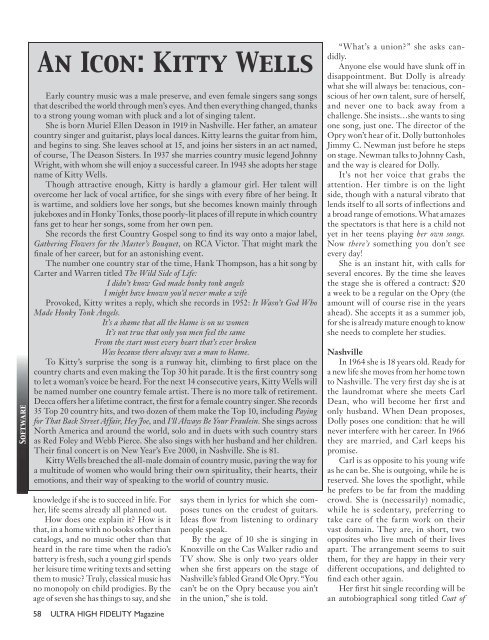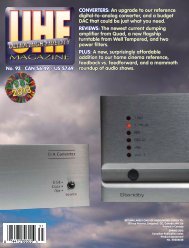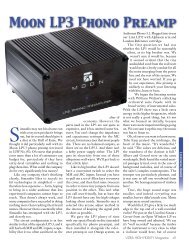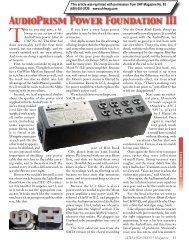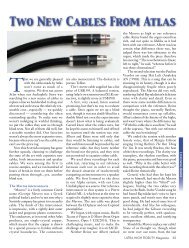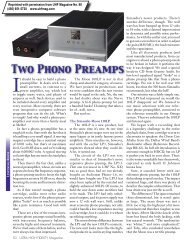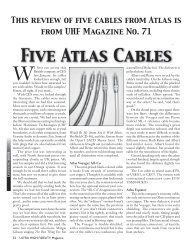download the PDF version - Ultra High Fidelity Magazine
download the PDF version - Ultra High Fidelity Magazine
download the PDF version - Ultra High Fidelity Magazine
You also want an ePaper? Increase the reach of your titles
YUMPU automatically turns print PDFs into web optimized ePapers that Google loves.
Software<br />
An Icon: Kitty Wells<br />
Early country music was a male preserve, and even female singers sang songs<br />
that described <strong>the</strong> world through men’s eyes. And <strong>the</strong>n everything changed, thanks<br />
to a strong young woman with pluck and a lot of singing talent.<br />
She is born Muriel Ellen Deason in 1919 in Nashville. Her fa<strong>the</strong>r, an amateur<br />
country singer and guitarist, plays local dances. Kitty learns <strong>the</strong> guitar from him,<br />
and begins to sing. She leaves school at 15, and joins her sisters in an act named,<br />
of course, The Deason Sisters. In 1937 she marries country music legend Johnny<br />
Wright, with whom she will enjoy a successful career. In 1943 she adopts her stage<br />
name of Kitty Wells.<br />
Though attractive enough, Kitty is hardly a glamour girl. Her talent will<br />
overcome her lack of vocal artifice, for she sings with every fibre of her being. It<br />
is wartime, and soldiers love her songs, but she becomes known mainly through<br />
jukeboxes and in Honky Tonks, those poorly-lit places of ill repute in which country<br />
fans get to hear her songs, some from her own pen.<br />
She records <strong>the</strong> first Country Gospel song to find its way onto a major label,<br />
Ga<strong>the</strong>ring Flowers for <strong>the</strong> Master’s Bouquet, on RCA Victor. That might mark <strong>the</strong><br />
finale of her career, but for an astonishing event.<br />
The number one country star of <strong>the</strong> time, Hank Thompson, has a hit song by<br />
Carter and Warren titled The Wild Side of Life:<br />
I didn’t know God made honky tonk angels<br />
I might have known you’d never make a wife<br />
Provoked, Kitty writes a reply, which she records in 1952: It Wasn’t God Who<br />
Made Honky Tonk Angels.<br />
It’s a shame that all <strong>the</strong> blame is on us women<br />
It’s not true that only you men feel <strong>the</strong> same<br />
From <strong>the</strong> start most every heart that’s ever broken<br />
Was because <strong>the</strong>re always was a man to blame.<br />
To Kitty’s surprise <strong>the</strong> song is a runway hit, climbing to first place on <strong>the</strong><br />
country charts and even making <strong>the</strong> Top 30 hit parade. It is <strong>the</strong> first country song<br />
to let a woman’s voice be heard. For <strong>the</strong> next 14 consecutive years, Kitty Wells will<br />
be named number one country female artist. There is no more talk of retirement.<br />
Decca offers her a lifetime contract, <strong>the</strong> first for a female country singer. She records<br />
35 Top 20 country hits, and two dozen of <strong>the</strong>m make <strong>the</strong> Top 10, including Paying<br />
for That Back Street Affair, Hey Joe, and I’ll Always Be Your Fraulein. She sings across<br />
North America and around <strong>the</strong> world, solo and in duets with such country stars<br />
as Red Foley and Webb Pierce. She also sings with her husband and her children.<br />
Their final concert is on New Year’s Eve 2000, in Nashville. She is 81.<br />
Kitty Wells breached <strong>the</strong> all-male domain of country music, paving <strong>the</strong> way for<br />
a multitude of women who would bring <strong>the</strong>ir own spirituality, <strong>the</strong>ir hearts, <strong>the</strong>ir<br />
emotions, and <strong>the</strong>ir way of speaking to <strong>the</strong> world of country music.<br />
knowledge if she is to succeed in life. For<br />
her, life seems already all planned out.<br />
How does one explain it? How is it<br />
that, in a home with no books o<strong>the</strong>r than<br />
catalogs, and no music o<strong>the</strong>r than that<br />
heard in <strong>the</strong> rare time when <strong>the</strong> radio’s<br />
battery is fresh, such a young girl spends<br />
her leisure time writing texts and setting<br />
<strong>the</strong>m to music? Truly, classical music has<br />
no monopoly on child prodigies. By <strong>the</strong><br />
age of seven she has things to say, and she<br />
58 ULTRA HIGH FIDELITY <strong>Magazine</strong><br />
says <strong>the</strong>m in lyrics for which she composes<br />
tunes on <strong>the</strong> crudest of guitars.<br />
Ideas flow from listening to ordinary<br />
people speak.<br />
By <strong>the</strong> age of 10 she is singing in<br />
Knoxville on <strong>the</strong> Cas Walker radio and<br />
TV show. She is only two years older<br />
when she first appears on <strong>the</strong> stage of<br />
Nashville’s fabled Grand Ole Opry. “You<br />
can’t be on <strong>the</strong> Opry because you ain’t<br />
in <strong>the</strong> union,” she is told.<br />
“What’s a union?” she asks candidly.<br />
Anyone else would have slunk off in<br />
disappointment. But Dolly is already<br />
what she will always be: tenacious, conscious<br />
of her own talent, sure of herself,<br />
and never one to back away from a<br />
challenge. She insists…she wants to sing<br />
one song, just one. The director of <strong>the</strong><br />
Opry won’t hear of it. Dolly buttonholes<br />
Jimmy C. Newman just before he steps<br />
on stage. Newman talks to Johnny Cash,<br />
and <strong>the</strong> way is cleared for Dolly.<br />
It’s not her voice that grabs <strong>the</strong><br />
attention. Her timbre is on <strong>the</strong> light<br />
side, though with a natural vibrato that<br />
lends itself to all sorts of inflections and<br />
a broad range of emotions. What amazes<br />
<strong>the</strong> spectators is that here is a child not<br />
yet in her teens playing her own songs.<br />
Now <strong>the</strong>re’s something you don’t see<br />
every day!<br />
She is an instant hit, with calls for<br />
several encores. By <strong>the</strong> time she leaves<br />
<strong>the</strong> stage she is offered a contract: $20<br />
a week to be a regular on <strong>the</strong> Opry (<strong>the</strong><br />
amount will of course rise in <strong>the</strong> years<br />
ahead). She accepts it as a summer job,<br />
for she is already mature enough to know<br />
she needs to complete her studies.<br />
Nashville<br />
In 1964 she is 18 years old. Ready for<br />
a new life she moves from her home town<br />
to Nashville. The very first day she is at<br />
<strong>the</strong> laundromat where she meets Carl<br />
Dean, who will become her first and<br />
only husband. When Dean proposes,<br />
Dolly poses one condition: that he will<br />
never interfere with her career. In 1966<br />
<strong>the</strong>y are married, and Carl keeps his<br />
promise.<br />
Carl is as opposite to his young wife<br />
as he can be. She is outgoing, while he is<br />
reserved. She loves <strong>the</strong> spotlight, while<br />
he prefers to be far from <strong>the</strong> madding<br />
crowd. She is (necessarily) nomadic,<br />
while he is sedentary, preferring to<br />
take care of <strong>the</strong> farm work on <strong>the</strong>ir<br />
vast domain. They are, in short, two<br />
opposites who live much of <strong>the</strong>ir lives<br />
apart. The arrangement seems to suit<br />
<strong>the</strong>m, for <strong>the</strong>y are happy in <strong>the</strong>ir very<br />
different occupations, and delighted to<br />
find each o<strong>the</strong>r again.<br />
Her first hit single recording will be<br />
an autobiographical song titled Coat of


